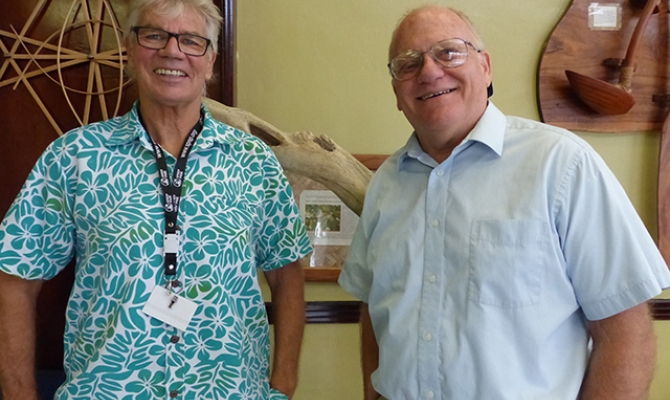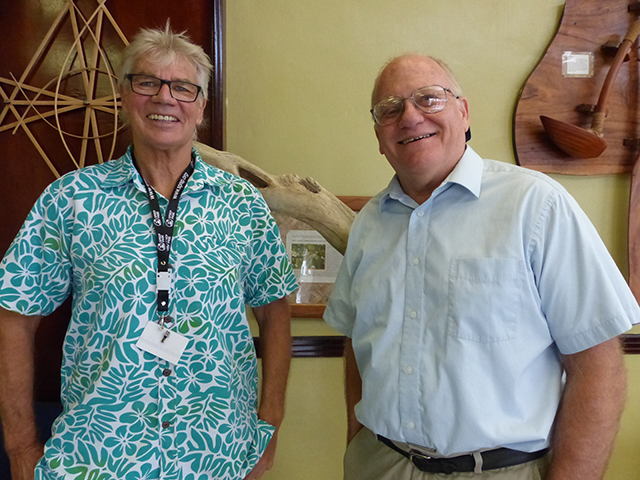
Island and Ocean Ecosystems
A new collaboration between SPREP and the International Whaling Commission (IWC) looks set to deliver benefits in the areas of whale conservation and welfare in the Pacific region. These benefits were highlighted yesterday at a special 'Year of the Whale' side event as part of the 25th Annual Meeting of the Pacific Regional Environment Programme in Majuro, Marshall Islands.
Over the past decade or more, several SPREP Members have declared their waters as whale sanctuaries and encouraged research projects on humpback whales, which annually migrate between summer feeding grounds in the Antarctic Ocean and over-wintering breeding grounds in the Pacific region.
At the side event, Mr David Mattila (Technical Adviser - Human Impact Reduction at the IWC) explained that the IWC's Scientific Committee recently completed an assessment of the data collected by the South Pacific Whale Research Consortium, and confirmed that the Oceania humpback population has turned the corner from near-extinction and is now trending toward recovery, making it one of the world's great conservation success stories. Humpbacks are also a valuable tourist attraction, recently estimated to be worth $5 million annually to Tonga alone.

Although the threat of hunting may have receded, whales are now facing new threats, including entanglement in fishing gear and other marine debris. The IWC conducts training for both members and non-members in safely disentangling whales, and recently held a successful workshop in Tonga.
Mr Mattila explained that scarring on the bodies of humpback whales indicates that a significant proportion of animals - perhaps more than a quarter - have become entangled in fishing gear such as lobster pots, longlines or gill nets at some stage in their lives. Safely disentangling whales requires training and specialist equipment, which is now available in Tonga and Vanuatu.
Participants also discussed ideas for the proposed '2016/17 Year of the Whale' in the Pacific island region. Mr Mike Donoghue, Threatened and Migratory Species Adviser at SPREP, reports that there was an enthusiasm on the part of many SPREP Members to participate in conservation actions for whales including further investigations into whale migration routes, the responsible management of whale-watching and the possible impacts of climate change. Other suggestions included further training in managing whale strandings and entanglement, investigating and mitigating possible impacts of seismic surveys and deep sea mining on whales and establishing protected areas for whales.
For more information, please contact Mike Donoghue at SPREP.
Over the past decade or more, several SPREP Members have declared their waters as whale sanctuaries and encouraged research projects on humpback whales, which annually migrate between summer feeding grounds in the Antarctic Ocean and over-wintering breeding grounds in the Pacific region.
At the side event, Mr David Mattila (Technical Adviser - Human Impact Reduction at the IWC) explained that the IWC's Scientific Committee recently completed an assessment of the data collected by the South Pacific Whale Research Consortium, and confirmed that the Oceania humpback population has turned the corner from near-extinction and is now trending toward recovery, making it one of the world's great conservation success stories. Humpbacks are also a valuable tourist attraction, recently estimated to be worth $5 million annually to Tonga alone.

Pictured above: Mr Mike Donoghue and Mr David Mattila.
Although the threat of hunting may have receded, whales are now facing new threats, including entanglement in fishing gear and other marine debris. The IWC conducts training for both members and non-members in safely disentangling whales, and recently held a successful workshop in Tonga.
Mr Mattila explained that scarring on the bodies of humpback whales indicates that a significant proportion of animals - perhaps more than a quarter - have become entangled in fishing gear such as lobster pots, longlines or gill nets at some stage in their lives. Safely disentangling whales requires training and specialist equipment, which is now available in Tonga and Vanuatu.
Participants also discussed ideas for the proposed '2016/17 Year of the Whale' in the Pacific island region. Mr Mike Donoghue, Threatened and Migratory Species Adviser at SPREP, reports that there was an enthusiasm on the part of many SPREP Members to participate in conservation actions for whales including further investigations into whale migration routes, the responsible management of whale-watching and the possible impacts of climate change. Other suggestions included further training in managing whale strandings and entanglement, investigating and mitigating possible impacts of seismic surveys and deep sea mining on whales and establishing protected areas for whales.
For more information, please contact Mike Donoghue at SPREP.